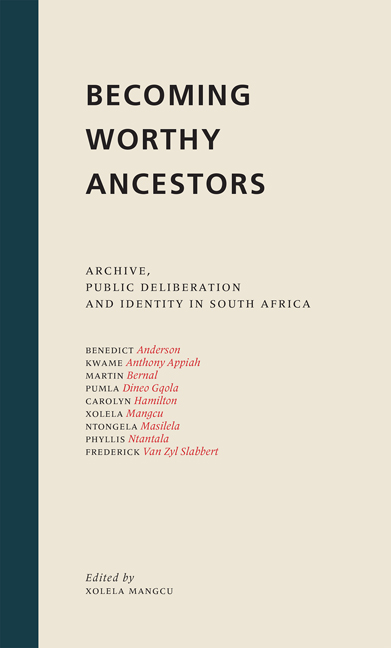Book contents
- Frontmatter
- Contents
- Preface
- Chapter One Evidentiary Genocide: Intersections of Race, Power and the Archive
- Chapter Two The Transmission Lines of the New African Movement
- Chapter Three Some Do Contest the Assertion That I Am An African
- Chapter Four Africa in Europe, Egypt in Greece
- Chapter Five Unconquered and Insubordinate: Embracing Black Feminist Intellectual Activist Legacies
- Chapter Six Identity, Politics and the Archive
- Chapter Seven The Goodness of Nations
- Chapter Eight Why Archive Matters: Archive, Public Deliberation and Citizenship
- Endnotes
- Index
Chapter Five - Unconquered and Insubordinate: Embracing Black Feminist Intellectual Activist Legacies
Published online by Cambridge University Press: 21 March 2018
- Frontmatter
- Contents
- Preface
- Chapter One Evidentiary Genocide: Intersections of Race, Power and the Archive
- Chapter Two The Transmission Lines of the New African Movement
- Chapter Three Some Do Contest the Assertion That I Am An African
- Chapter Four Africa in Europe, Egypt in Greece
- Chapter Five Unconquered and Insubordinate: Embracing Black Feminist Intellectual Activist Legacies
- Chapter Six Identity, Politics and the Archive
- Chapter Seven The Goodness of Nations
- Chapter Eight Why Archive Matters: Archive, Public Deliberation and Citizenship
- Endnotes
- Index
Summary
Nationalism is a contradictory, rather than coherent discourse: its internal contradictions are laid bare in its female figures, in gendered tropes that are inherently unstable.
[I]t is perceived as the norm that men will not only lead [political] processes, but also that their participation is never questioned or subject to scrutiny and debate in the same manner as women's participation or leadership roles. This reinforces the notion that conflict, politics and peace building processes are vividly about male power and domination.
It is one of the ironies of history that the most pervasive and total oppression, the oppression of women, has been to a large extent neglected by scholars within the ranks of the movement. This can be explained, in part, by the male chauvinism which has been the bane of colonial liberation movements, and also the imprecise terms in which we discuss the future socio-economic order we envisage for a free South Africa. And yet, the success or otherwise of our struggle may depend on the extent to which we are able to involve as wide as possible a front of liberation forces against the oppressor regime.
This paper moves from the premise that there are various Black women's intellectual legacies in South Africa and that they are not self-evident is due to a variety of racialised and gendered processes that mask, mythologise and delegitimise women's agency. Women are (dis)remembered and celebrated similarly across academic, political and other public spheres. On the one hand, we find women in stereotypical, stoic, mother roles, hypersexualised, passive and supportive roles; parading as the full spectrum of women's presence, they render all other forms of women's subjectivity unrecognisable. On the other hand lie attitudinal and institutional discourses where women's relevance is simply functional and contained in ‘women's issue’ topics. Both hands contribute to the ‘invisibilisation of black women's work’.
In June 2011, as the country mourned the death of the anti- apartheid struggle leader Albertina Sisulu, the bulk of the public discourse referred to her role as Walter Sisulu's beloved wife, the matriarch of the Sisulu extended family, who mothered some of the Mandela children during Nelson Mandela's incarceration, having introduced Mandela to her cousin Evelyn.
- Type
- Chapter
- Information
- Becoming Worthy AncestorsArchive, Public Deliberation and Identity in South Africa, pp. 67 - 88Publisher: Wits University PressPrint publication year: 2011



